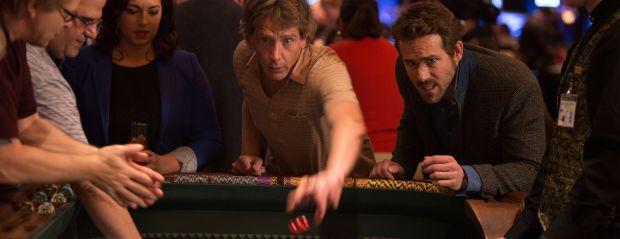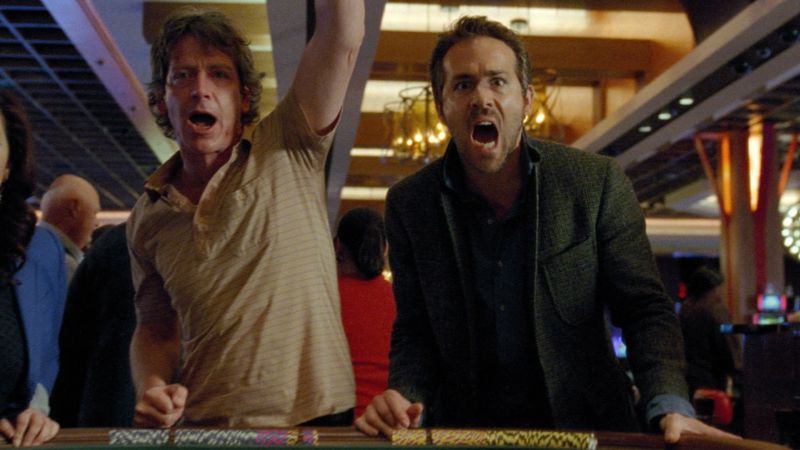Movie Review: Mississippi Grind
9 years ago

23 Oct
Last Year’s Mississippi Grind came and went without much fanfare, despite a starring turn from Deadpool himself as a talkative poker player with mysterious motivations for gambling. In the film he hooks up with a down on his luck real estate agent – played by Ben Mendelsohn – with a major gambling problem and a Lusitanian wreck of a life. After bonding over a mutual love of bourbon the two pals head out on a road trip down the Mississippi towards a high-stakes poker game in New Orleans.
That’s the plot, such as it is. Like most road trip movies the journey is mostly a framework for us to spend time in and around a world with these characters. The real road trip – you might just say – takes place in the characters’ hearts. Well, Ryan Reynold’s character at least; Mendelsohn’s real estate agent gets a rather more ambiguous ending.
It is written and directed by Ana Boden and Ryan Fleck whose credits are largely made up of TV episodes, but who do excellent work with the look and feel of the film.
California Split
Mississippi Grind doesn’t reference California Split in its credits. The title feels like a conscious reference to Robert Altman’s 1974 gambling road trip movie, as does most of Ben Mendelsohn's performance. The opening, and the ending are pretty much beat for beat versions of the older film’s script and there are certain tonal associations.
It feels like a slightly shinier, less nihilistic remake. Which is both its strength and weakness. It comes out badly in the comparison, most of the edges have been sanded down, the characters are a little more likeable and there is an air of hope which broadens its appeal (although clearly not that widely) but also renders it less satisfying in the final analysis.
These characters shouldn’t be redeemable, and ending where it does the film gives them something almost like a happy ending.
On the other hand, I loved the slowed down pace, the focus on character over plot. And in this regard the movie did feel like it could be a minor work by one of those great 70’s directors. The real momentum and pleasure of the film is just in finding out what makes them tick and following along as they make mostly horrible life decisions.

Tone and Character
In fact, the whole production manages to maintain a definite 70s feel. Cell-phones excepted the flick is pretty era-less. The cars are old and beat-up, there is smoking in the casinos, the houses Ben Mendelsohn sells have that white-washed wooden slatted thing going on.
The performances also seem to be from another era. Reynolds for once seems to get lost in the character, giving a fantastically controlled performance. After Green Lantern, Deadpool bought him forgiveness. With this performance I think that festering wound is fully healed.
While he does play the happy go lucky drifter you might expect from the man who played Van Wilder – he is certainly there as the light relief – his comedy is extremely restrained, and he is given a certain gravity by his enigmatic motivations.
He tells tall tales, and claims to play poker just for the thrill of being there: for the stories, for the people. Because he is so unreliable a narrator, we have to find out about who he is by his choice of lie. The most telling of which is that he doesn’t to care if he wins or loses. I suspect he is a character from whom most audience member will end up getting out what they bring in.
But he also works as a MacGuffin (i.e. an object which has no practical purpose but to drive the plot forward). Mendhelson’s character pins all his hopes on Reynolds as a lucky charm, catapulting the two of them onto the road, where Mendelsohn becomes the real star of the piece.
He gives a schlubby run down performance invoking the kind-of introverted character played by George Segal in California Split. Every gesture of Mendelsohn’s hand and every line on his face seems weighed down by desperation in a way that creates a moral ambivalence in the viewer. He brings his suffering on himself, literally and karmically, but somehow it is still tough to see the guy get put through the ringer.
He also gives Mississippi Grind its one major edge over California Split. The older film suffered from a lack of stakes, no matter what happened everyone seemed to always be alright, that worked for the nihilistic tone of that film, but for this slightly softer movie what draws you in is the fact that Mendelsohn's miserable existence is taking its toll. This is a world where debt collectors show up at your house, and wives leave you, and losing brings with it massive shame and guilt. The movie definitely gave me the feels, mostly sadness.

In Short
So, overall Mississippi Grind is a nice throwback sort of movie that owes a massive debt to California Split. It is slow-burning and character-driven, with an air of what James Baldwin called ‘pious ambiguity’ – that almost religious feeling one gets when certain details remain unexplained, or only hinted at.
I liked it, and would certainly recommend it for the performances alone; but probably not too soon after watching California Split which you should do now if you haven’t already.






Comments
You need to be logged in to post a new comment